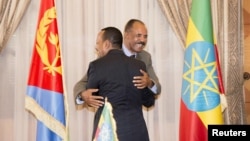Foreign donors must come forward to support Ethiopia and Eritrea after the long-time arch rivals ended a war which spanned two decades and hampered efforts to improve the lives of millions of people, a top United Nations official said on Monday.
Ahunna Eziakonwa, head of the U.N. in Ethiopia, said moves taken by the two east African neighbors to normalize ties in recent weeks had "sown seeds of hope" — but added that many challenges lay ahead on their road to recovery.
The two poor nations will have to remove landmines and rebuild infrastructure, especially along their border, where the conflict was concentrated.
They will also need to stimulate their economies and create jobs for the youth, say experts.
"I hope the international community will come forward to support these two countries. It is very important — not just for these two nations, but for regional peace and security," Eziakonwa told the Thomson Reuters Foundation in an interview.
"It makes strategic sense — not just from the humanitarian perspective, but also from a security perspective - to rally behind this peace initiative and invest in a peace building process in a way that it touches on development transformation."
Triggered by a border dispute in 1998, the conflict killed more than 80,000 people. At least 350,000 people living along the border on both sides were uprooted and forced to flee.
Meagre resources meant to reduce poverty and improve basic services such as health and education were diverted to fund the conflict while schools, hospitals, power and water supplies were destroyed by shelling and artillery fire.
Reward for peace
The two nations signed a peace deal in 2000 — but Ethiopia refused to implement it. Both armies have since been facing off across their border in a frozen stalemate.
Abiy Ahmed, who became Ethiopia's prime minister in April, agreed to implement the deal, and there has been a rapid thaw in relations since the war was declared over on July 9.
Ahmed and Eritrean President Isias Afewerki have visited one another's capitals to be welcomed by thousands of cheering crowds. Embassies have reopened, phone lines between both nations are restored and flights have resumed.
But other obstacles lie ahead. Millions of dollars will be required to support Ethiopia and Eritrea, which are among the world's 47 least developed countries, according to the U.N. Eziakonwa said this included removing thousands of landmines along the 1,000-km (620-mile) border and rebuilding roads and other infrastructure for easy cross-border trade and movement.
Thousands of young people in both nations are expected to be demobilized and there will be an urgent need to provide them with jobs, she said.
"One of the biggest challenges is how to engage the youth in both countries in gainful employment and we need partners such as the international community and private sector to rally behind this new opportunity," said Eziakonwa. "Obviously, you don't want a whole lot of idle youth. They need to see the dividends of peace and that will largely be born out when we see the kinds of investments that integrate them into the economy."
Eziakonwa said neither Addis Ababa nor Asmara had requested international assistance so far, but the U.N. was ready to assist in areas ranging from de-mining to helping to foster social cohesion and reconciliation.
"It's an initiative that is home-grown — brought by the leaders concerned - and this is very rare," said Eziakonwa. "We need to reward these gestures and show them as an example of what can be achieved."
NAIROBI —





